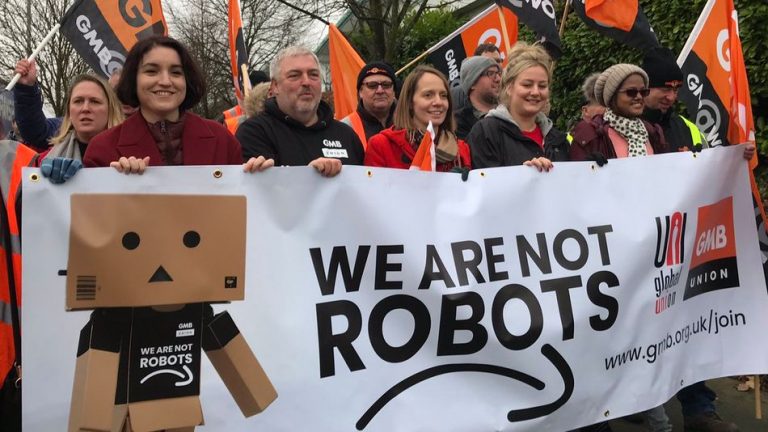On Monday and Tuesday this week, Amazon workers took part in protests and strikes in five different countries around the world. Workers in the US, Germany, the UK, Spain and Poland targeted Amazon Prime Day, a period of sales being heavily promoted by the company in order to boost its profits. Workers in a Minnesota warehouse went on strike for 6 hours, and workers in 7 German warehouses are on strike for the whole period of the Amazon Prime Day. In the UK, Poland and Spain, workers have been protesting their working conditions.
These actions come after Amazon extended their “Prime Day” discounting period to two days as well as promising one-day delivery. This would increase the strain on workers who are already pushed to their absolute limits. In recent years a stream of scandals surrounding the treatment of Amazon workers has come to light, including workers having to urinate in bottles to avoid being punished for taking too long on bathroom breaks, pregnant workers reportedly being made to stand for 10 hour shifts, and emergency workers being summoned to warehouses on hundreds of occasions to deal with suicide attempts, suicidal thoughts and other mental-health episodes.
While workers suffer these dire conditions, Jeff Bezos, Amazon’s CEO and founder is currently the richest man in the world, with wealth estimated at $110 billion. Moreover, Amazon is also being held responsible by protestors for aiding and abetting the Trump administration to conduct its mass deportation policies. Amazon Web Services allegedly works with other companies such as Palantir Technologies to provide technology services to US border control agencies such as Immigration and Customs Enforcement and the Department of Homeland Security.
These strikes and protests are hugely significant for several reasons. The actions are an indication of a growing resistance among workers after a sustained attack on working conditions over the course of the last 30 years of neoliberalism. At a time when union membership has dramatically declined in the developed world, these non-unionised workers are fighting for a union and for decent, humane working conditions and pay. Moreover, it is hugely encouraging to see workers across different countries combining to act against a massive multi-national corporation. Building this kind of international solidarity is crucial now given that the biggest corporations in the world have more money and power than many small states. It also seems that there are major cracks appearing in the image of corporations like Amazon, who until recently were being lauded for their success and staggering profits.
If the Amazon workers can stay organised and militant, they have a chance of scoring a significant victory against one of the behemoths of global capitalism. This could provide great inspiration for workers trying to organise for better conditions around the world.
Victory to the Amazon workers!












